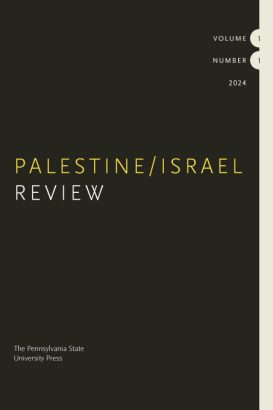Alex Stein argues that by imposing a rigid ideological standard for scholarship on Israel-Palestine, the new journal Palestine/Israel Review seeks to delegitimise the discipline of Israel Studies and marginalise its practitioners. Alex is a founding editor of the Tel Aviv Review of Books and author of the Love of the Land Substack.
Since 7 October it’s become clearer than ever that the conflicts between pro-Israeli and pro-Palestinian students on American campuses are proxy wars for the real war between Israel and Hamas in Gaza. Instead of missiles and bullets, the students use words and ideology as their weapons, with ‘decolonisation’, ‘Zionism’, and ‘genocide’ a few of the terms used for battle.
This is the background to the announcement of a new academic journal, the Palestine/Israel Review. In the introduction, the scholars Tamir Sorek and Honaida Ghanim argue that the
separated study of Palestinians and Israelis obscures an emerging cross-disciplinary understanding that Palestinian and Israeli societies are both intertwined and independent and that, in many cases, our analysis of social, political, and cultural processes suffers when we examine them separately.
This is an interesting premise, and it’s important to state from the outset that there’s nothing objectionable about examining Palestinian and Israeli society from this perspective. Where relevant, examining the intertwined nature of the two societies is a valuable endeavour: one that, when done appropriately, can help shed light on the situation in all sorts of interesting ways.
However, a closer look reveals that the authors are only calling for contributions from scholars who share their very particular perspective on Israeli and Palestinian society and indeed on Israel Studies itself. They write: ‘Israel Studies emerged as part of an effort to mobilize American public opinion for supporting Israel,’ while ‘Palestine studies was born as a defensive mode to tell a story that had been eclipsed and silenced.’ Today, there are more than 30 units, centres, institutes, and endowed chairs (without a centre) in Israel Studies worldwide (not including two units inside Israel and the Occupied Territories), and four English-language academic journals dedicated to Israel. Meanwhile, there are now four endowed centres or positions in the United States and the UK dedicated to Palestine Studies, and three journals. ‘Because we consider our journal as extending the field of Palestine Studies,’ the authors write, ‘the above-mentioned institutional weakness of the field, by itself, is a good reason for establishing another platform for publication in the field.’
This comparison is false because it downplays the importance of Middle Eastern Studies. There are hundreds of Middle Eastern Studies centres across the US whose size and impact are today far more significant than Israel Studies. Flush with Saudi and Qatari funding, they have disseminated the idea of Israel as an illegitimate settler colonial entity – an idea that the founders of this new journal require its authors to share – for decades. As the authors themselves concede, the Palestinian narrative is ‘more firmly anchored and more globally accepted than at any time in the past century.’ It would be more accurate to say that the Palestinian position is now dominant in the academy – and particularly in Middle Eastern Studies – except for some Israel Studies departments. Thus, the real objective of the journal is to render illegitimate this tiny corner of the academy still offering an alternative to the hegemonic narrative.
Predictably, then, much of the authors’ disdain is directed at Israel Studies. The authors give the example of a study of the impact of the Law of Return on Reform and Conservative Jewish converts, and how this
ignores the role this law has played in the Judaization of the country and the dispossession of Palestinians. The omission of these aspects not only normalizes them and tacitly legitimizes dispossession, but also misses the broader matrix of power within which these intra-Jewish struggles are taking place.
This example can’t have been picked at random: the Law of Return is the most significant piece of legislation underpinning the State of Israel. Critiquing a specific article is all well and good, but the claim here is more insidious, because it means that anyone who doesn’t share the authors’ perspective on the Law of Return – a debatable, highly-contested claim that wouldn’t be accepted by most Israelis or supporters of Israel – would not be welcomed as contributors to the Palestine/Israel Review. By suggesting that their potential authors accept a certain narrow perspective of the world as a prerequisite for contributing to their journal, the authors are promoting an exclusionary fallacy. In short, it’s intellectual blackmail.
‘In hindsight,’ they continue, ‘one could argue that the field of Israel Studies rendered itself insular and irrelevant by its very name. Studying Israel without Palestine has proven to embody a denial of the colonial origins of the state of Israel and its contemporary settler-colonial practices.’ This, though, can’t be the real objection, A cursory look at the recent output at some of the Israel Studies journals mentioned in the article reveals a special issue on ‘Representations of Israeli-Jewish – Israeli-Palestinian Memory and Historical Narratives of the 1948 War,’ ‘Oslo: Three Decades Later’ and a special section on BDS, to name but a few. In other words, their objection isn’t that Israel studies ignores Palestine but that it doesn’t accept their ‘Palestine/Israel’ paradigm as gospel.
In an interview with the anti-Zionist Jewish Currents, the international relations scholar Sonia Boulous, who is also involved in the project, described this position in plainer language. In response to a question about ‘dual narratives,’ she said: ‘Our project is not about seeing this as some sort of territorial conflict between two equal parties.’ Here my own personal experience is relevant: For many years I’ve guided for Mejdi Tours, a tour company that adopts the ‘dual narrative’ approach, one that has often attracted criticism for ‘normalization.’ I’ve always felt this criticism to be unfair. Adopting a ‘dual narrative’ perspective does not necessitate denying the imbalance of power between the two parties, or the undeniable fact that Palestinians currently have less freedom and rights than Israeli Jews. What it does mean, though, is acknowledging that Israelis and Palestinians have two different perspectives on the history of the land, and that the idea the conflict between them will end with one side agreeing with the other is a fantasy. Anyone who seeks to improve the situation must reckon with this reality.
The ‘Palestine/Israel’ approach also artificially reduces the field to these two actors. Every single modern Israel-Palestine war has been transnational. At best, the average Middle Eastern studies scholar will highlight the role of Western imperialism while downplaying or ignoring the ongoing Arabisation and repression of minorities throughout the Middle East, or the imperial ambitions of Iran and its proxies, which have been on full display since 7 October. They seek the deconstruction of Zionist hegemony while asking nothing of the other side. They claim that Israel cannot be understood without considering Zionist oppression but do not seek to place Palestinians in the wider context of Arab imperialism. A good scholar should ask the same question of every group.
It also truncates the actual history of the region to the modern period alone. Reducing the study of Israel to one that revolves around modern Palestine is a way of erasing the Jewish and Arab past. Even without biblical sources, there are 1,500 years of documented Jewish history in the region before the Arabs become a significant force there. Israel Studies and Zionism cannot be understood without this historical backdrop. Palestinian history too must be seen in this longue durée, to gain a sense of the genesis and development of Palestinian society in all its forms, from the first settlement of Arab communities to the creation of Arab cities and place names throughout the land.
In adopting their approach, the founders of the new journal are seeking to succeed in academia where the Palestinians have failed in the real world: they are accepting wholesale the ideological underpinnings of the Palestinian national movement as the national liberation movement of an indigenous people against foreign colonisers, despite all the neglected history described above. This is a power play – a conquest of the intellectual space in lieu of a conquest of the physical space. If one accepts this approach, then there is no longer any need for Israel Studies, at least as nothing more than a subsection of Palestine Studies. Instead of a correction, there will be a strengthening of the increasingly dominant position. ‘The no man’s land separating the study of Palestinians and Israelis needs to be disturbed and rebuilt as a space for decolonization of academia,’ the authors write. By adopting this approach, they are swapping academia for advocacy; they should have the honesty to say so.

































